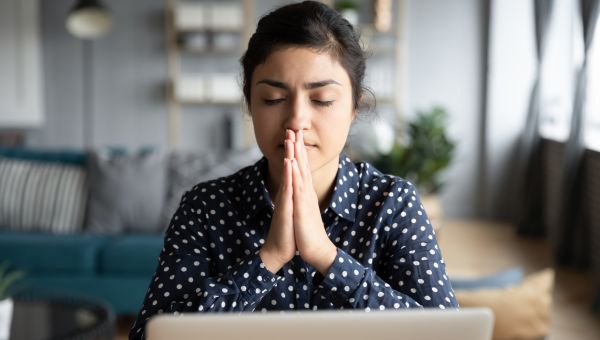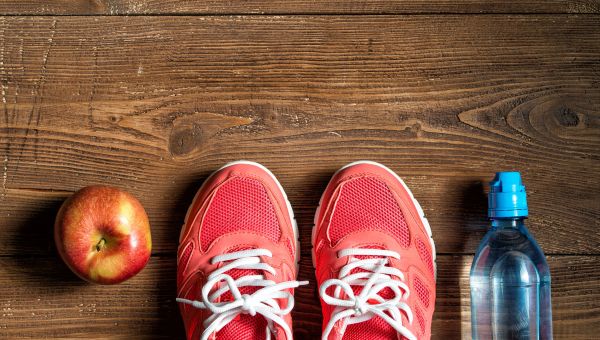8 stress relief tricks ER doctors swear by
Try these expert-approved tips the next time you're feeling overwhelmed.

There are few places more stressful than an emergency room (ER). Doctors must quickly deliver appropriate care to patients while remaining calm, cool and collected. So, who better to offer stress-busting tips than ER doctors? We asked eight ER doctors to share their most effective stress-reducing strategies. Use these expert-approved tips the next time you’re feeling overburdened and anxious.
Medically reviewed in June 2018.

Count to 10 and make a to-do list
“Count to 10. Seriously. Then make a to-do-list,” says Tony Wanna, MD, of Presbyterian/St. Luke’s Medical Center.
Multi-tasking and interruptions can be stressful, says Dr. Wanna. “They decrease the brain’s ability to analyze critical information and increase the chance of unforced errors.” After counting to 10 uninterrupted, Wanna refocuses on the tasks at hand, prioritizes them in a list, and then proceeds calmly with his to-do list.

Take a deep breath
"Stop and breathe. Even when patients with medical emergencies are arriving in masse, you still have five seconds. Stop and breathe in deeply 2 or 3 times before you jump back in the fray,” says Jon Pandgia, MD, of Grand Strand Medical Center.
Another tip form Dr. Pandgia: shake it off. “After you remove yourself or before you get home, take a minute and drop your shoulders to let that imaginary weight drop to the ground."

Step outside for a quick break
The one thing you can do to best handle your busiest and most stressful days in the ER is to be prepared for them and mindful with your actions during them, says Preston Wendell, MD, of Summerville Medical Center.
“For me, this means getting enough sleep the night before, exercising in the morning if I have an afternoon or night shift, and clearing my plate of any small administrative tasks so I that can completely focus on clinical matters while at work.”
During his shift, Dr. Wendell always likes to take some time away from the department to get coffee or go outside for some fresh air and peacefulness. “Even a five-minute break can rejuvenate and refocus you for the rest of your shift. Afterwards, if I can put away my phone and computer for the rest of evening and just relax and spend time with my family I always feel better the next morning,” he says.

Slow down and prioritize your tasks
“I try to mentally prepare for a shift before I go in so that when things get hectic, I slow down and prioritize what needs to be done first, second, third and fourth,” says Steven Goodfriend, MD, of Orange Park Medical Center. “With so many interruptions, it's easy to get bogged down and easily distracted.”
A to-do list with deadlines can help you feel like you have things under control. Regular exercise can help you maintain a clear mind, says Dr. Goodfriend. I regularly exercise because that actually gets me feeling better too before and after the shift, he adds.

Hit the mall
“After a busy stressful day I actually like to shop. I have to drive by an outlet mall to get home so I often stop for relaxation,” says Travis Jasper, MD, of Fairview Park Hospital.
Shopping doesn’t always mean Dr. Jasper will actually buy something, but it does allow him to exercise by walking from store to store, interact with someone pleasant since they want me to buy, and think about numbers and things that aren't critical to someone's life, he says.
“Getting the best deal and searching for the sales has never put anyone in the hospital,” he adds.

Focus on the big picture and smile
“On those stressful, overwhelming days, I keep focused. I sit back, take a deep breath and smile, because smiling gives a perspective on what you are doing. I am helping people, I have a great job and I am so blessed to work with such great staff,” says Trent Boyko, MD, of Medical City Arlington. “Your attitude and perspective as the leader of the emergency room sets a tone for the entire department. It makes those difficult days go by so much easier.”

Exercise and connect with others
Want to know one stress-relieving habit that ER physician Darria Long Gillespie, MD, of Northside Hospital swears by?
“My run! Even a short one before or after work helps me focus, have more energy and keep calm in even the craziest days,” says Darria Long Gillespie, MD. "Also helpful? Connecting with my patients. It can be easy to forget this when it’s busy, but taking an extra moment to connect helps me care for them better, comfort them and it reminds me why I love this job."

Adopt simple health habits
“If you’ve seen The Lego Movie, you’ve undoubtedly heard the “Everything Is Awesome” song. I use that song as my cell phone ringtone. Why? Because everything is not awesome!” says Scott Hickey, MD, of Chippenham Hospital.
There’s no magic elixir to soothe our decision and physical fatigue, but there are some commonsense approaches you can try like drinking less soda, eating less candy, getting quality sleep and taking the stairs instead of the elevator, says Hickey. Having lived with sleep apnea, Hickey understands the impact sleep conditions can have on your stress load.
“Accepting the limitations of our bodies and working towards maintaining our health will go a long way to off-loading our mental and physical fatigue. Spend some time taking inventory of your life and reflect on opportunities to make things better for you and your family.”
More On


video

article

slideshow


video


video
